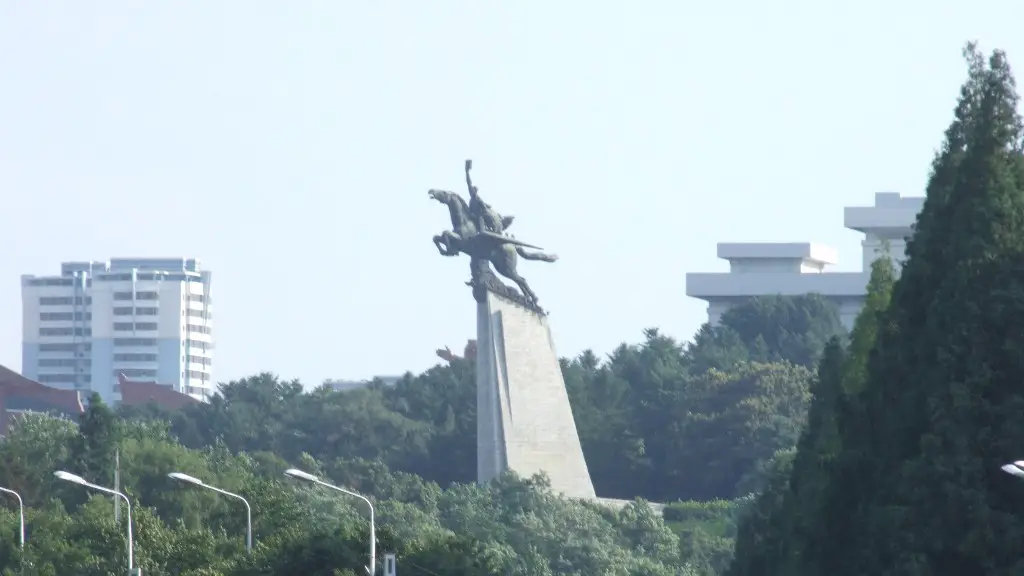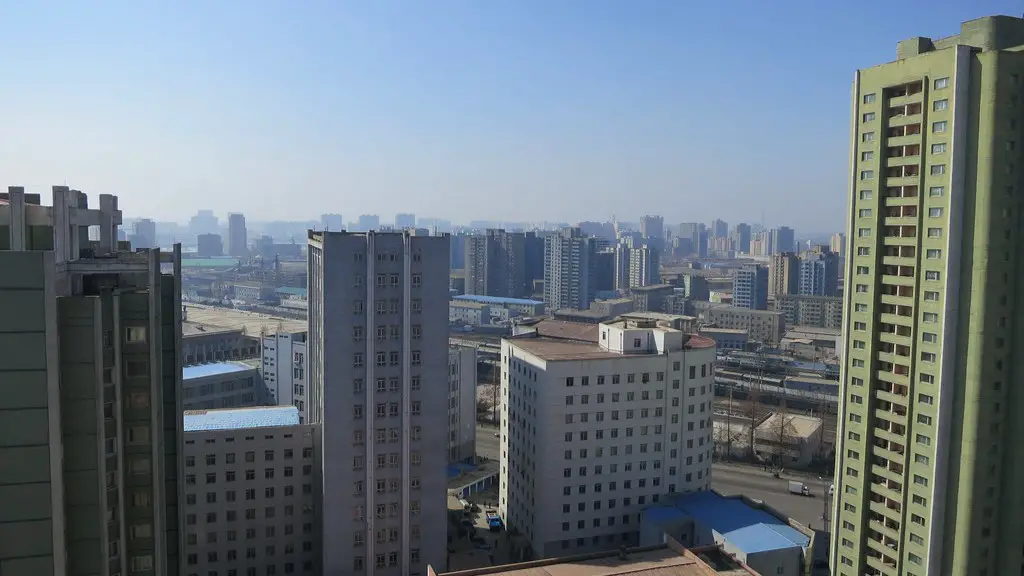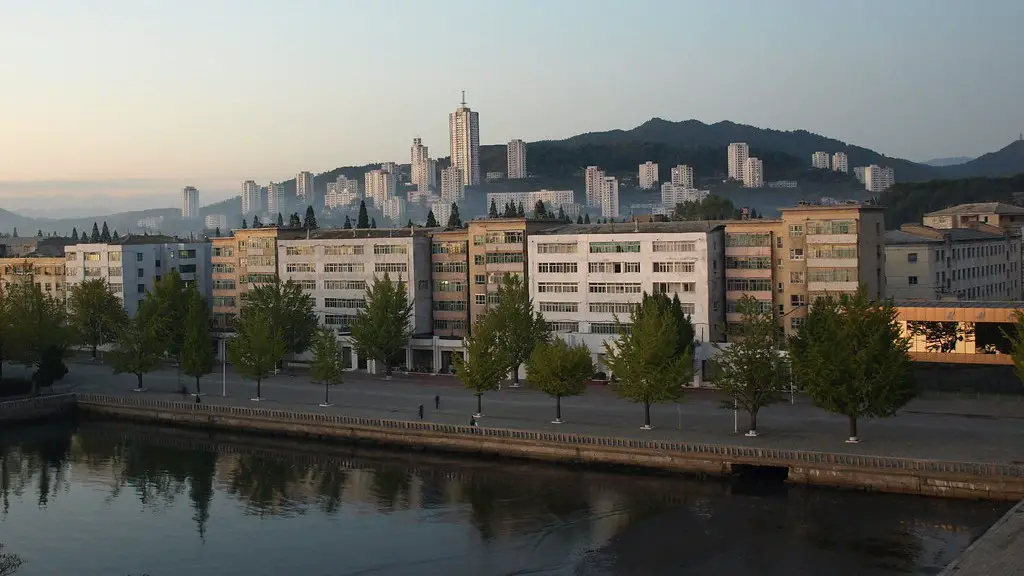Background Information
North Korea is a repressive and isolated country ruled by a dynastic dictatorship, with the totalitarian regime of Kim Jong-un leading the regime since 2011. North Korea has been a closed country since 1953, when it split off from South Korea in the aftermath of the Korean War. The regime has taken a hardline stance, refusing to open up to the outside world for fear of “contamination” by western culture and ideologies. As a result, the regime has developed a hostile attitude towards all other countries, with a particular focus on the US and South Korea.
The Military Threat
The regime in Pyongyang is known for its aggressive stance and rhetoric, as highlighted by its nuclear tests and the series of missile launches in recent years. The regime’s nuclear program and missile arsenal pose a serious threat to its neighbors in the region, as well as to other countries in the world. North Korea has developed a range of short- and long-range missiles, some of which are capable of carrying nuclear payloads, while the country is believed to have up to 20 nuclear warheads. This, combined with the regime’s bellicose rhetoric, has stoked fears of a potential nuclear conflict in the region.
Human Rights Abuses
The North Korean regime has also been accused of numerous human rights abuses, including torture and extrajudicial killings. The regime is reported to maintain an extensive network of internment camps to incarcerate generic political prisoners, as well as individuals seen as dissidents or potential threats to the regime. Prisoners in these camps are subjected to a range of inhumane treatments, including forced labor, malnutrition and torture. In addition, the regime suppresses all forms of political dissidence, such as organizing protests or writing or printing books without official approval, and often resorts to intimidating tactics such as mass arrests and executions.
International Pariah
The international community has taken a strong stance against the North Korean regime, with the UN Security Council passing a series of resolutions condemning the country’s human rights abuses, nuclear tests and missile launches, and imposing sanctions on the government and associated companies. As a result, North Korea is politically and economically isolated, with few countries maintaining diplomatic relations with the regime. The country remains under heavy sanctions, which has further exacerbated its already dire economic situation.
Economic and Social Struggles
The impact of the sanctions has been particularly evident on North Korea’s population, as the country has been struggling to address its acute food shortages and crumbling infrastructure. The country is also reported to have one of the world’s worst rates of malnutrition, with over 10 million people facing food insecurity. The nation’s lack of access to modern medical equipment and medicine also leaves its population vulnerable to various diseases, such as tuberculosis and malaria.
Censorship and Surveillance
The North Korean government also operates a strict system of censorship and surveillance, with citizens only allowed access to state-controlled media sources. The regime has been known to take drastic measures to stop the spread of foreign media and the internet, deploying a range of surveillance technologies to monitor and curb people’s access to information. This has resulted in some of the most restrictive information policies in the world, with people who possess foreign media being arrested and punished by the authorities.
Brainwashing and Indoctrination
The North Korean government has also been accused of employing tactics designed to brainwash its citizens, such as the promotion of the cult of personality around the country’s leaders. Children are taught from an early age to venerate the supreme leader and his family, with little to no access to alternative views and ideas. Schools also conduct compulsory ideological indoctrination classes and emphasize the importance of loyalty to the regime.
Corruption and Nepotism
North Korea is also known for its rampant levels of corruption and nepotism, which exacerbates the already dire economic and social situation of the country. The Kim family is reported to exercise a tight grip on the country’s economy, controlling large portions of North Korea’s revenues through a complex network of state-run companies and state-controlled financial institutions. As a result, money and resources tend to be concentrated among a small circle of elites, rather than reaching the general population.
Political Interviews and Interactions with the Regime
As North Korea remains highly closed off to outsiders, most of the news and information about the country comes from the few people who have managed to visit the country and experience its political system first-hand. Through political interviews and engagements with North Korean officials, outsiders have been able to gain a greater understanding of the country’s inner workings and its leaders’ motivations to maintain their grip on power.
The US-North Korean Relationship
The US-North Korean relationship has been characterized by tension and volatility in recent years, with the two countries exchanging a series of provocative threats and insults. The US has maintained a hardline approach towards Pyongyang, imposing more sanctions and maintaining its policy of “maximum pressure” on the regime. The North Korean government, on the other hand, has been adamant in its pursuit of its nuclear and missile programs, while also threatening to use its arsenal in the event of an attack.
Talks and Diplomatic Efforts to Solve the Crisis
Despite the tensions, numerous diplomatic attempts have been made to de-escalate the situation and resolve the North Korean crisis, as reflected by the series of multilateral talks and bilateral negotiations between the North Korean and US governments. These attempts, however, have thus far been unsuccessful in convincing Pyongyang to give up its nuclear and missile programs, and maintain its rule without resorting to intimidation and repression.
The Role of China and other Regional Powers
The Chinese government has been seen as a major player in the North Korean issue, providing the regime with economic and political support, while also taking a more active role in the negotiations between Pyongyang and Washington. Japan and South Korea, two of the US’s closest allies in the region, have also called on China and other regional actors to use their influence over the North Korean regime to encourage it to abandon its nuclear ambitions, though with little success so far.
Increased US and South Korean Military Presence
The US and South Korean governments have also been strengthening their military presence in the region, deploying warships and conducting joint military exercises. These moves have been seen as a response to the regime’s provocations and increasing military capabilities, and have sparked fears of a potential armed conflict in the region.
Cultural Exchange Programs
At the same time, the international community has been trying to break the country’s isolation by advocating for more open dialogue and cultural exchange programs, as well as providing humanitarian aid and educational opportunities. Through these initiatives, outsiders have gained a greater understanding of North Korean culture and life under the Kim family’s rule, while North Korean citizens have also been given the opportunity to experience the outside world.
Conclusion
North Korea continues to be an enigma to most of the world, with its authoritarian and repressive rule causing fear and apprehension in the international community. Despite its isolation, North Korea has shown a capacity to hold its own in nuclear negotiations, while its missile and nuclear capabilities remain a major threat in the region. As such, the international community must find a way to achieve a lasting resolution to the crisis and ensure that peace and stability persists in the region.



